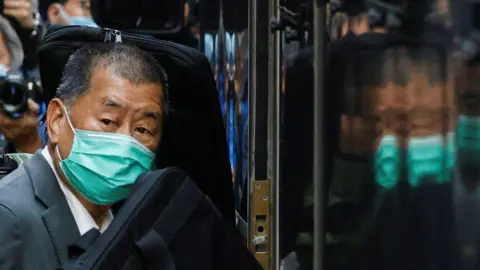Jimmy Lai release is a priority for the UK, says PM
 Reuters
ReutersSecuring the release of pro-democracy activist and British citizen Jimmy Lai from a Hong Kong prison is a "priority" for the government, Sir Keir Starmer has said.
During Prime Minister's Questions, Conservative leader Rishi Sunak asked if Lai's imprisonment was a breach of the 1984 treaty transferring power over Hong Kong from the UK to China.
The prime minister agreed it was a breach and said the government would "continue" to raise the case with China.
Lai, who is 76, was arrested in 2020 for fraud and involvement in protests and, following delays, is now facing trial for sedition and collusion with foreign forces.
His son called for "action" from Sir Keir to "save my father's life".
Sebastien Lai said he was "grateful" for the prime minister's comments.
But he added: "My father will be 77 soon, he has spent close to four years in solitary confinement in a maximum security prison for peacefully campaigning for democracy in Hong Kong.
"As you can expect his health has deteriorated by a lot. I would ask our prime minister to put word to action, to save my father’s life and bring him home.”
Jimmy Lai has pleaded not guilty, but would face life in prison if convicted.
Lai founded the now-defunct newspaper Apple Daily and was involved in pro-democracy protests in Hong Kong.
Under the 1984 Joint Sino-British Declaration, China agreed Hong Kong would enjoy a "high degree of autonomy" and retain certain rights including freedom of assembly and speech.
However, over time China has increased its control over the former British colony and in 2020 it passed the National Security Law, making it easier to clamp down on protests.
Lai's lawyer has been critical of the UK government's involvement in the case.
"We are told Jimmy Lai’s case is a priority for the government. So why has the foreign secretary still failed to meet with us and Sebastien, his son, despite repeated requests?" she told The Times on Tuesday.
Caolifhionn Gallagher said of the past five foreign secretaries, only David Cameron had met Lai's legal team.
She said: “This is a disappointing and flawed approach that stymies crucial efforts to free Jimmy Lai and fundamentally undermines the government’s official position that he must be released.”
Pressed on the case by Sunak, Sir Keir said: "This case, as he will understand, is a priority for the government.
"We do call on the Hong Kong authorities to release immediately our British national.
"The foreign secretary raised this case, in his first meeting with China's foreign minister, and we will continue to do so," he added.
Foreign Secretary David Lammy is expected to visit China this week.
Ms Gallagher said the question was what the government would do "before it is too late".
She added: "This case must be top of the government’s agenda in its engagement with China.”
Sunak also used Prime Minister's Questions to ask Sir Keir about the implementation of the Foreign Influence Registration Scheme.
In 2023, the Conservative government established plans for a scheme that would force those working for a foreign power or body to declare their lobbying activities.
It was triggered partly by growing concern about China's clandestine activities in the UK.
The scheme had been due to come into force this year, but the Home Office has confirmed that is "no longer expected".
Sunak said the scheme had been described as "essential" by MI5 and asked why the prime minister had "halted" its implementation.
Sir Keir simply replied: "That isn't correct."
"That is very clearly what the government has said," Sunak replied adding: "I would urge him to get up to speed on this issue and, therefore, implement the scheme."
The prime minister's spokesman later told reporters the scheme would "strengthen national security" and that work to get it in place was "under way".
Sunak also criticised the government for stopping the implementation of the Freedom of Speech Act, which he said would help "defend universities" from Chinese political influence.
The prime minister said he knew "first-hand" the work done by the security and intelligence services and that the government "supports them in everything they do".
